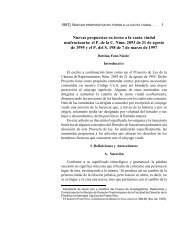OSJ-2007-pc Opinión sobre titularidad de terrenos ... - LexJuris
OSJ-2007-pc Opinión sobre titularidad de terrenos ... - LexJuris
OSJ-2007-pc Opinión sobre titularidad de terrenos ... - LexJuris
You also want an ePaper? Increase the reach of your titles
YUMPU automatically turns print PDFs into web optimized ePapers that Google loves.
Consulta Núm. 07-130-B<br />
Página Núm. 48<br />
254 <strong>de</strong>l Código Civil, 31 L.P.R.A. § 1023 (énfasis suplido). De igual forma, el<br />
Artículo 255 <strong>de</strong>l Código Civil dispone que “[s]on bienes <strong>de</strong> dominio público, los<br />
<strong>de</strong>stinados al uso público, como los caminos, canales, ríos, torrentes, y otros<br />
análogos”. Art. 255 <strong>de</strong>l Código Civil, 31 L.P.R.A. § 1024. A su vez, el Artículo 256<br />
<strong>de</strong>l Código Civil dispone que son bienes <strong>de</strong> uso público en Puerto Rico y en sus<br />
pueblos, los caminos estaduales y los vecinales, las plazas, calles, fuentes y aguas<br />
públicas, los paseos y las obras públicas <strong>de</strong> servicio general, costeadas por los<br />
mismos pueblos o con fondos <strong>de</strong>l tesoro <strong>de</strong> Puerto Rico. Art. 256 <strong>de</strong>l Código Civil,<br />
31 L.P.R.A. § 1025. Todos los <strong>de</strong>más bienes que el Estado Libre Asociado <strong>de</strong><br />
Puerto Rico o los municipios posean son patrimoniales y se regirán por las<br />
disposiciones <strong>de</strong>l mencionado Código Civil. Id.<br />
Nótese que este esquema tripartito representa una diferencia a lo dispuesto por el<br />
Código Civil <strong>de</strong> España, el cual sólo establecía dos formas opuestas <strong>de</strong> goce<br />
(dominio público y propiedad privada). Según el Código Civil <strong>de</strong> España, la<br />
distinción primordial <strong>de</strong> las cosas es el carácter relativo y mutable <strong>de</strong> éstas en y<br />
fuera <strong>de</strong>l comercio. Sin embargo, en Puerto Rico, a partir <strong>de</strong>l 1902, contamos con<br />
un nuevo estado normativo, el cual proviene <strong>de</strong>l mo<strong>de</strong>lo <strong>de</strong> Louisiana.<br />
El or<strong>de</strong>namiento relativo a los distintos tipos <strong>de</strong> cosas y bienes en Louisiana se<br />
pue<strong>de</strong> <strong>de</strong>scribir sucintamente <strong>de</strong> la siguiente manera:<br />
Things are first divi<strong>de</strong>d in the Louisiana Civil Co<strong>de</strong> into common,<br />
public, and private. This division <strong>de</strong>rives from the Romanist tradition<br />
and corresponds with divisions of things in the civil co<strong>de</strong>s of other<br />
jurisdictions.<br />
The division of things into common, public, and private rests on the<br />
i<strong>de</strong>a that, according to law, common things may not be owned by<br />
anyone, public things may only be owned by the state and its<br />
political subdivisions in their capacity as public persons, and<br />
private things may be owned by private persons as well as by the state<br />
and its political subdivisions in their capacity as private persons. Thus,<br />
common things are not susceptible of ownership; public things are<br />
insusceptible of private ownership; and private things are<br />
susceptible of private ownership.













